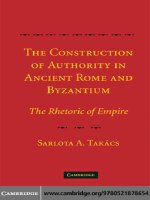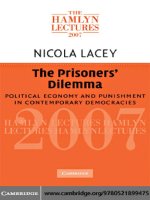cambridge university press moral limit and possibility in world politics sep 2008 kho tài liệu bách khoa
Bạn đang xem bản rút gọn của tài liệu. Xem và tải ngay bản đầy đủ của tài liệu tại đây (1.62 MB, 330 trang )
This page intentionally left blank
Moral Limit and Possibility in World Politics
At what point can we concede that the realities of world politics require that
moral principles be compromised, and how do we know when a real ethical
limit has been reached? This volume gathers leading constructivist scholars
to explore the issue of moral limit and possibility in global political dilemmas. The contributors examine pressing ethical challenges such as sanctions, humanitarian intervention, torture, the self-determination of
indigenous peoples, immigration, and the debate about international criminal tribunals and amnesties in cases of atrocity. Their analyses entail
theoretical and empirical claims about the conditions of possibility and
limits of moral change in world politics, therefore providing insightful
leverage on the ethical question of ‘what ought we to do?’ This is a valuable
contribution to the growing field of normative theory in International
Relations and will appeal to scholars and advanced students of international ethics and political theory.
RICHARD M. PRICE
is Associate Professor in the Department of Political
Science at the University of British Columbia. He is the author of The
Chemical Weapons Taboo (1997) and the co-editor (with Mark W. Zacher)
of The United Nations and Global Security (2004).
Cambridge Studies in International Relations: 107
Moral Limit and Possibility in World Politics
EDITORS
Christian Reus-Smit
Nicholas Wheeler
EDITORIAL BOARD
Thomas Biersteker, Phil Cerny, Michael Cox, A.J.R. Groom, Richard
Higgott, Kimberley Hutchings, Caroline Kennedy-Pipe, Steve Lamy,
Michael Mastanduno, Colin McInnes, Louis Pauly, Ngaire Woods
Cambridge Studies in International Relations is a joint initiative of Cambridge
University Press and the British International Studies Association (BISA). The series
will include a wide range of material, from undergraduate textbooks and surveys to
research-based monographs and collaborative volumes. The aim of the series is to
publish the best new scholarship in International Studies from Europe, North
America and the rest of the world.
C A M B R I D G E S T U D I E S I N I N T E R N AT I O N A L R E L AT I O N S
106
Emma Haddad
The refugee in international society
Between sovereigns
105
Ken Booth
Theory of world security
104
Benjamin Miller
States, nations and the great powers
The sources of regional war and peace
103
Beate Jahn (ed.)
Classical theory in international relations
102
Andrew Linklater and Hidemi Suganami
The English School of international relations
A contemporary reassessment
Series list continues after index
Moral Limit and
Possibility in
World Politics
Edited by
RICHARD M. PRICE
CAMBRIDGE UNIVERSITY PRESS
Cambridge, New York, Melbourne, Madrid, Cape Town, Singapore, São Paulo
Cambridge University Press
The Edinburgh Building, Cambridge CB2 8RU, UK
Published in the United States of America by Cambridge University Press, New York
www.cambridge.org
Information on this title: www.cambridge.org/9780521888165
© Cambridge University Press 2008
This publication is in copyright. Subject to statutory exception and to the provision of
relevant collective licensing agreements, no reproduction of any part may take place
without the written permission of Cambridge University Press.
First published in print format 2008
ISBN-13 978-0-511-41383-4
eBook (EBL)
ISBN-13
978-0-521-88816-5
hardback
ISBN-13
978-0-521-71620-8
paperback
Cambridge University Press has no responsibility for the persistence or accuracy of urls
for external or third-party internet websites referred to in this publication, and does not
guarantee that any content on such websites is, or will remain, accurate or appropriate.
Contents
List of contributors
page vii
Preface
ix
1
1
Moral limit and possibility in world politics
RICHARD PRICE
2
Constructivism and the structure of ethical reasoning
CHRISTIAN REUS-SMIT
3
The role of consequences, comparison and counterfactuals
in constructivist ethical thought
53
83
KATHRYN SIKKINK
4
Sovereignty, recognition and indigenous peoples
112
JONATHAN HAVERCROFT
5
Policy hypocrisy or political compromise? Assessing
the morality of US policy toward undocumented migrants
138
AMY GUROWITZ
6
Lie to me: sanctions on Iraq, moral argument
and the international politics of hypocrisy
165
MARC LYNCH
7
Paradoxes in humanitarian intervention
197
MARTHA FINNEMORE
8
Inevitable inequalities? Approaching gender equality
and multiculturalism
225
ANN TOWNS
v
vi
9
Contents
Interstate community-building and the identity/difference
predicament
253
BAHAR RUMELILI
10
Progress with a price
281
RICHARD PRICE
Index
305
Contributors
Martha Finnemore, Professor, Department of Political Science, George
Washington University.
Amy Gurowitz, Lecturer, Political Science Department and Peace and
Conflict Studies Program, University of California, Berkeley.
Jonathan Havercroft, Assistant Professor, Department of Political
Science, University of Oklahoma.
Marc Lynch, Associate Professor, Department of Political Science and
Elliott School of International Affairs, George Washington University.
Richard Price, Associate Professor, Department of Political Science,
University of British Columbia.
Christian Reus-Smit, Professor and Head, Department of International
Relations, Research School of Pacific and Asian Studies, Australia
National University.
Bahar Rumelili, Assistant Professor, Department of International
Relations, Koç University, Istanbul, Turkey.
Kathryn Sikkink, Regents Professor and McKnight Distinguished
University Professor, Department of Political Science, University of
Minnesota.
Ann Towns, Assistant Professor, Department of Political Science,
University of Delaware.
vii
Preface
The intellectual trajectory from which this book grew owes much to my
interactions and collaborations with fellow students, instructors and
colleagues, and my own students over the years. The question of ethics
in world politics has been my abiding intellectual interest since my
master’s degree at Carleton University, where I wrote a thesis on the
ethics of strategic defences. Fen Hampson, an International Relations
scholar, and Tom Darby, a political theorist, generously humoured my
immature probings into a subject that didn’t really fit in either discipline
as commonly practised, particularly when I ventured astray from traditional moral philosophy and into interpretive approaches to ethics, the
philosophy of technology and other terrain that was quite exotic for a
subject traditionally under the ambit of strategic studies. As I look back
upon that project, I see this volume in many ways as the logical and
(hopefully) more mature outcome of that earlier, less self-conscious and
more inchoate attempt to bridge philosophy, ethics and politics. Peter
Katzenstein, Henry Shue and Judith Reppy subsequently lent their
essential support to an interpretive and structural approach to understanding moral norms in world politics for my Ph.D. dissertation, later a
book, which examined the chemical weapons taboo from a genealogical
perspective. The move from interpretivism to constructivism, and later
from structure to agency, occupied the next stage of my intellectual
agenda, one that was particularly and powerfully influenced by my
interactions with my fellow students at Cornell, colleagues encountered
through Peter Katzenstein’s Culture of National Security project and
elsewhere, and colleagues and students at the University of Minnesota.
Representatives from all of those intellectual communities are in this
volume, though many of course could not be included within an already
substantial book, which John Haslam of Cambridge University Press
has been so generous in accommodating. But the absence of those
colleagues and others from this volume is not because I have learned
any less from them: Dan Thomas, Nina Tannenwald, Beth Kier,
ix
x
Preface
Michael Barnett, Alex Wendt, Thomas Risse, Emanuel Adler, Ward
Thomas, Neta Crawford, Helen Kinsella, Rado Dimitrov, Kristin
Willey, Nick Wheeler and Jeff Checkel to name a few, with sincere
apologies to any I have neglected to mention. Often it was the flash
inspired by a single comment from one such colleague that sparked core
ideas for my own pursuit. My years at the University of Minnesota were
the perfect sounding board for engaging the strengths and shortcomings
of constructivism and critical theory in thinking about ethics, given the
intellects of Kathryn Sikkink and Bud Duvall and the graduate students
who sometimes felt pushed or pulled between mainstream International
Relations, constructivism and critical theory, but who always came out
the better because of it. This project grew directly out of those interactions, since I became convinced that the current incarnations of neither
constructivism nor critical theory to date had satisfactorily responded
to the pressing prescriptive questions of ethics. Namely, just what
should we do? What is ethically justifiable if we are obviously not in a
position to attain our highest ideals, which may spring from our most
clever critiques of what others have actually been able to accomplish in
the world? Both traditions of course have enormous potential to contribute in a more satisfactory and direct way to how we think about and
answer ethical challenges in world politics, and this volume is a first
attempt to lay out an architecture of what such a synthesis might entail.
It is a genuinely collaborative book, to the extent that so many of the
formulations or even precise sentences and paragraphs appearing in any
given chapter may have come from another participant in the project
that we decided to dispense with the courtesy of acknowledged sources
with a footnoted ‘thanks to so and so for this formulation’ and instead
issue this blanket acknowledgement that the individual chapters themselves typically bear no small imprint of the other collaborators.
This volume was supported by a Social Sciences and Humanities
Research Council of Canada Aid to Research Workshops and
Conferences in Canada grant, financial and administrative support
from the Center of International Relations at the Liu Institute at the
University of British Columbia, and matching financial support from
the Department of Political Science, Faculty of Arts, and Vice President
Research, all of the University of British Columbia. I am most grateful
for the efficient research assistance of Alana Tiemessen and Scott
Watson.
Preface
xi
Sincere thanks to the reviewers of this volume, as engaging with their
generous and challenging comments considerably improved this book.
Thanks for the same reason to the participants at meetings where this
project was presented – the University of Minnesota, University of
Chicago, the Australian National University, the University of British
Columbia, the University of Queensland, and the American Political
Science Association Annual Meeting in Philadelphia.
Thanks to Jesse and Annelise for allowing pops/daddy to kick you off
the computer so many times with such good cheer, to Lisa for putting up
with the late nights spent at the keyboard, and to Nova for being such a
good companion by my side as I typed.
Vancouver
May 18, 2007
1
Moral limit and possibility in world
politics
RICHARD PRICE
Introduction
At what point, if any, is one to reasonably concede that the ‘realities’ of
world politics require compromise from cherished principles or moral
ends, and that what has been achieved is ethically justified? How do we
really know we have reached an ethical limit when we see one, or fallen
short in ways that deserve the withholding of moral praise? Less
abstractly, how might we seek to reconcile the cherished freedoms of
liberal democracy with restrictions on immigration? Can war legitimately be waged in defence of human rights, and override competing
moral claims to self-determination? Can the perpetuation of slaughter
be risked by refusing amnesties to perpetrators of atrocities in order to
enforce international criminal law? Is there any way to ethically navigate moral dilemmas such as the above, ones that seem to require
choices between cosmopolitanism and communitarianism, or consequentialism and deontology, or the oft-competing demands between
procedural and substantive justice?
As the history of ethics and international political theory attest, these
are difficult enough questions for which to hope for some answer, not
the least given traditions of thought like realism that deny the very
existence of developments we could call ethically progressive change
in world politics in the first place. But it becomes even more difficult still
if a research programme that has itself led the charge in empirically
documenting putative moral progress inherently problematises the very
grounds upon which prima facie judgements of moral good are often
made. How does one even approach the task of formulating robust
answers to questions of ethics that can respond to charges of subjectivism and relativism when coming out of an intellectual tradition that
suggests all such judgements and the complexes of intersubjective meanings that make them possible are themselves but time- and culturebound constructions? Moreover, what if, due to the critical theoretical
1
2
Moral Limit and Possibility in World Politics
insights underpinning social constructivism, constructivist analyses lead
us to identify that what appear prima facie to be progressive initiatives
are themselves revealed to come at the price of concomitant regress in
other areas? What if, for instance, the price of extending a peaceful
security community of democratic states is the ‘othering’ of outsiders?
Or if domestic progress on gender issues was predicated upon political
bargains that entailed setbacks in progressive immigration policy? What
if transnational civil society’s successful influence curtailing the use of
landmines is bought at the price of simultaneously strengthening the
surveillance and coercive powers of the state? Or if the bargains to
establish an International Criminal Court (ICC) guard crucial elements
of the prerogative of states as it forwards a paradigm of human security?
How do we evaluate – and justify to victims and their families – amnesties
given to perpetrators of atrocities, secured in order to stop ongoing
slaughter? Or could they later not be rescinded in the name of justice?
Are there theoretical responses that can help us navigate through such
ethical challenges that confront us in contemporary world politics? Talk
of progress has long been the purview of liberal and critical theories of
International Relations (IR), whose champions in different ways have
laid claim to the moral high ground in pointing the ways to positive
moral change. And yet both have been the targets of persistent charges
of utopianism. Recent constructivist scholarship on the role of norms in
international relations, I have argued elsewhere, has responded convincingly to such charges with careful empirical research that demonstrates
the possibilities of moral change in world politics.1 But while it has thus
opened up convincing space for taking seriously the role of moral
change in the study and practice of international relations, this literature
for the most part has not offered its own normative or prescriptive
defences of particular changes as good – such positions are often not
explicitly articulated let alone rigorously defended.2 Upon what basis
are accounts of moral change, which are presumed to be desirable, to be
accepted as in fact progressive? While the challenge of having to offer a
convincing defence of the ethical desirability of norms like the abolition
1
2
Richard Price, ‘Transnational Civil Society and Advocacy in World Politics’,
World Politics 55:4 (2003), 579–606.
See Nicholas Wheeler for a conspicuous exception: Saving Strangers:
Humanitarian Intervention in International Society (Oxford: Oxford University
Press, 2000).
Moral limit and possibility in world politics
3
of slavery or torture would not exactly keep too many constructivist
scholars up at night, constructivist analyses do render many other cases
potentially problematic as intimated above. Moreover, it is hardly the
case that all self-designated constructivists agree on what is ethically
right in a given situation, which problematises empirical claims of
progressive change in world politics. Not all change is necessarily
morally ‘good’, and neither is all behaviour that conforms with the
international community’s existing moral standards necessarily morally
laudable – so what are the standards for evaluation, an externally
derived set of moral standards, or ones dependent upon existing
moral norms which constructivists take seriously as structuring the
very ethical standards that are available to us to invoke for judgement?
Rather than attempting to impose a singular definition for all the discipline of what counts as moral progress here in the introduction, the
authors in this volume are rather inveighed to defend their usages of
‘good’ and ‘progress’ by being explicit concerning what they view as
moral progress and from where it is derived, including to be as selfconscious as possible about how our/their own particular context may
shape those very standards that they seek to employ. For the most part,
the contributions of this volume share a humanitarian, cosmopolitan
vein, though the relationship between constructivism and substantive
theories of international relations is engaged in sections below and
directly in the concluding chapter.
The evolution of criticisms of constructivist scholarship as well points
to normative theorising as a next stage of the constructivist agenda.
Much constructivist work was itself a response to scepticism that moral
norms matter in world politics. While a few critics still seek to challenge
that empirical claim, in the face of empirical scholarship demonstrating
the explanatory value of moral norms, the centre of the debate moved to
a challenge of how to explain why some norms matter in some places
and not others,3 and responses to that challenge have occupied much of
the norms literature in recent years. The remaining avenue to challenge
scholarship which touts moral change in world politics is that this
agenda (and constructivism generally) has been beset by a normative
bias in favour of ‘good’ norms that worked. While initially couched in
3
Jeffrey Checkel, ‘The Constructivist Turn in International Relations Theory’,
World Politics 50:2 (1998), 324–348.
4
Moral Limit and Possibility in World Politics
methodological terms,4 this challenge itself is only coherent with its
own normative premise (namely, of what counts as ‘good’). In order
to respond to this criticism, scholars ultimately must turn to some form
of normative defence, and how constructivism itself might help us to do
so in a rigorous way is a central challenge taken up by this volume. To
be sure, this challenge goes both ways: critics who make such charges
can only make them intelligible on the basis of their own normative
defences of what qualifies as good or undesirable norms, else the
critique is simply incoherent. This has put the moral question front
and centre, among additional reasons argued by Christian Reus-Smit
in the next chapter. Not surprisingly, the more that constructivism has
addressed the empirical, theoretical and methodological challenges of
its critics, the more the sceptical critique has taken on an explicitly
normative cast. In response to the plethora of scholarly works demonstrating the importance of norms and the role of transnational advocacy
networks in world politics for such developments as the Landmines
Convention, the rise of humanitarian intervention, and milestones in
international criminal law including tribunals and the ICC, critics
increasingly have been responding along the line that they simply don’t
agree that such norms are ‘good’.5 For all of these reasons, normative
theorising is inescapable in making claims about possibilities of moral
change in world politics, and thus central to practice and intellectual
discourse in International Relations, even as professionally it has not
been accorded pride of place in the American academy of International
Relations which has been dominated by explanatory agendas that
largely exclude normative theorising as the terrain of ‘political theory’,
‘normative theory’ or philosophy.6
4
5
6
Paul Kowert and Jeffrey Legro, ‘Norms, Identity and their Limits’. In Peter
Katzenstein (ed.), The Culture of National Security: Norms and Identity in World
Politics (New York, NY: Columbia University Press, 1996), 451–497.
See, e.g., Kenneth Anderson, ‘The Ottawa Convention Banning Landmines, the Role
of International Non-Governmental Organizations, and the Idea of International
Civil Society’, European Journal of International Relations 11:1 (2000), 91–120.
Surveying what are widely regarded as the top three journals in International
Relations in North America – International Organization, International Security and
World Politics – over the period 1990–2006, at most four articles could be identified
that are arguably characterised as engaging in normative as opposed to primarily
explanatory analysis. In contrast, International Relations scholarship in the UK has
accorded a much more prominent place to normative theorising. Reus-Smit notes
in his chapter, however, the normative turn in the work of Robert Keohane, one of
the most prominent positive scholars of American International Relations.
Moral limit and possibility in world politics
5
While not expressed precisely in the above terms, the lack of prescriptive theorising issuing from the constructivist movement in the field
of International Relations has not gone unnoticed in the literature.
Mervyn Frost in particular has laid an important challenge in noting
that critical and sociological approaches in International Relations have
for the most part eschewed explicit ethical theorising in favour of
descriptivism and explanation. As he puts it:
the task of IR theory according to constitutive theorists is to reveal
our global international social order to be a human construct within
which are embedded certain values chosen by us and to show how
this construct benefits some and oppresses others. This seems to be
pre-eminently an exercise in ethical evaluation. It would seem to be
self-evident that scholars (be they critical theorists, post-modern
theorists, feminist IR scholars, constructivists, or structuration theorists) involved in such evaluative exercise must engage in serious
ethical argument – argument about what is to count as oppression
(as opposed to liberation), about what is to count as an emancipatory
practice (as opposed to an enslaving one), about what would be fair in
international relations, what just, and so on. However, in practice,
constitutive theorists have done very little of this kind of theorizing.
They do not for the most part tackle the question ‘What would it be
ethical to do in the circumstances?’7
Indeed, this is an astute observation and fair charge insofar as a chief
motivation of some such constructivist work (at least I can speak for my
own) precisely has been to open up space for moral progress in world
politics by empirically documenting successes that give lie to the sceptical position that the pursuit of moral progress in world politics is folly.
That humanity is not simply and always condemned to the raw exercise
of brute power is no small finding, since the consequences are of course
unspeakably dire in an era of nuclear and other weapons of mass
destruction if the sceptical thesis were correct. Nonetheless, this leaves
unanswered – from constructivists, as of yet – the above challenge of
normative defences of change in world politics, at least on Frost’s terms,
which are those of the traditions of ethical theory.
7
Mervyn Frost, ‘A Turn Not Taken: Ethics in IR at the Millennium’, Review of
International Studies 24 (1998), 127. As Neta Crawford has also noted,
‘constructivists have little to say about what to do’. Argument and Change in
World Politics (Cambridge: Cambridge University Press, 2002), 427.
6
Moral Limit and Possibility in World Politics
Seen from the perspective of constructivists themselves, to take up this
challenge may not simply translate into a charge for constructivists or
others to engage in recognisably moral theorising of the type that might
bring a Michael Walzer, Charles Beitz, Henry Shue or Peter Singer to
mind. Indeed, a reasonable response could be that it is not to be
expected that empirically oriented researchers should or even could
become adequately accomplished moral philosophers. Rather, the challenge is whether constructivism has anything distinctive and valuable to
offer in terms of normative theorising, in terms of the prescriptive
dimension of political thought and practice, and thus to the practice
of making decisions and judgements in world politics. That is to say,
what does constructivism contribute to the prescriptive question posed
for so long by political theorists, one so central to all politics: how are
we to act? What exactly are the theoretical and practical implications of
this constructivist opening up of moral space? Does constructivism itself
have anything to offer towards normative theorising that can help
resolve some of the evaluative dilemmas noted at the outset, and thus
contribute in some capacity as moral guides to action? Or is its primary
contribution simply to open a wider door for well-established ethical
theories like utilitarianism, rights-based or deontological theories and
the like to show their faces more fully and frequently in the scholarly
field of International Relations, without challenging, modifying or
contributing to those theories? What would constructivist contributions
to normative theorising look like, if one were to integrate the insights of
constructivism regarding the possibilities and limits of moral change?
What advantages could it bring to existing normative theories and
practice? In the next chapter, Christian Reus-Smit deals with some of
these issues in the wider context of the purposes of International
Relations scholarship and the development of the discipline, as well as
making the case for a broader conception of ethics than the dominant
mode of the deduction of principles. For now, it will suffice to state that
the premise of this volume is that research programmes which have
shown how moral norms arise and have an impact on world politics are
well placed to help us answer the ethical question of ‘what we should
do’. Since social constructivist analyses of the development and effects
of moral norms entail theoretical and empirical claims about the
conditions of possibility and limits of moral change in world politics,
that agenda should provide insightful leverage on the ethical question of
‘what to do’ insofar as one accepts that a responsible answer depends
Moral limit and possibility in world politics
7
not just on what one judges as right in the abstract, but also on what one
may have some reasonable expectation of working, and thus prescribing as a course of action or judgement.8 That is, without denying
altogether the essential role of idealism, an understanding of the limits
and possibilities of moral change should provide additional rigorous
grounds for ethics, particularly insofar as I argue in what follows that
normative theory and ethical prescriptions cannot completely eschew
their own empirical assumptions even as they rarely develop them as
systematically as has constructivism. In this chapter I thus outline six
major contributions of constructivism for theorising moral limit and
possibility and addressing global ethical dilemmas that provide the
framework for the substantive chapters which follow. They include:
(1) attention to the relation between the ethical and empirical, including providing a way to help adjudicate the empirical bases of ethical
positions; (2) recognition of the empirical importance of the debate
between rationalist and constructivist accounts of agency and their
relevance for normative theorising; which include (3) the identification
of different kinds of hypocritical political practice which in turn imply
different ethical evaluations of hypocrisy; (4) the illumination of
neglected dimensions for ethics, including the identification of different kinds of dilemmas arising from a focus on the constitutive effects of
norms; (5) the relevance of relations of co-constitution for thinking
through issues of complicity and cooptation; and (6) a theoretical account
of morality that avoids the tendency of philosophical approaches to
ethics to sidestep questions of power, without falling prey to the shortcomings of post-structuralist ethics that do highlight power. Before outlining those contributions, I canvass how some of the major relevant
works in the existing normative literature in International Relations have
dealt with these issues in order to make readily apparent the value-added
of constructivism, focusing in particular upon a few key recent works in
contemporary critical and constitutive normative theory since they have
addressed questions most directly similar to those posed here.
8
Cognisant of the apparent contrast with Kant’s criticism of what he termed the
naturalist fallacy – that the ‘ought’ hinges upon the ‘is’ – I would note that Kant
himself suggested that the demands of ethics stand independent of empirical
likelihood but not to the point where ethics demands what is demonstrably
impossible to fulfil. The position here seeks to excavate constructivism for help to
answer the question of just how we know when we can say we’ve reached such
conditions of possibility and impossibility.
8
Moral Limit and Possibility in World Politics
Critical theory and normative theorizing in International
Relations
Critical theory is a tradition in International Relations that has brought
to the fore questions revolving around moral change and its limits. In
response to the persistent charges of the utopianism of the critical theory
tradition, Robert Cox notably acknowledged that while critical theory
necessarily contains an element of utopianism, it is constrained by its
sociological understanding of historical processes. As he argued:
Critical theory allows for a normative choice in favour of a social and
political order different from the prevailing order, but it limits the range
of choice to alternative orders which are feasible transformations of the
existing world. A principal objective of critical theory, therefore, is to
clarify this range of possible alternatives. Critical theory thus contains
an element of utopianism in the sense that it can represent a coherent
picture of an alternative order, but its utopianism is constrained by
its comprehension of historical processes. It must reject improbable
alternatives just as it rejects the permanency of the existing order.9
Little concrete has been forthcoming, however, concerning how one
would construct such a theoretical project or what it would look like,
specifically in the sense of how one could tell a political and ethical
possibility from an impossibility. Until recently, few explicit clues had
been provided by critical International Relations theorists as to how to
make these imperatives of the desirable and the possible mesh. Indeed,
prominent critical theorists themselves have often been explicit that they
do not seek to provide ‘practical’ ethics and solutions to substantive
moral problems as that would be anathema to the critical theoretical
project.10 But how then would we know a justifiable ethical limit to
change when we saw one, or recognise a possibility to be realised? How
do we justify such limits and possibilities? This has been a particularly
acute problem for critical theory, I would argue, since a number of
9
10
Robert Cox, ‘Social Forces, States, and World Orders: Beyond International
Relations Theory’. In Robert Keohane (ed.), Neorealism and its Critics
(New York, NY: Columbia University Press, 1986), 210.
For a sympathetic overview of critical theory’s contributions to ethics that
provides a critical challenge to its reluctance to ‘do ethics’ in the applied sense, see
Robyn Eckersley, ‘The Ethics of Critical Theory’. In Duncan Snidal and Christian
Reus-Smit (eds.), Oxford Handbook of International Relations (forthcoming).
Moral limit and possibility in world politics
9
recent initiatives like the landmines campaign of the 1990s that would
prima facie appear to epitomise a morally progressive critical social
movement were subjected to condemnation from some critically
minded scholars in conversations within and outside the academy.
This was most surprising not only to this scholar, nurtured in the varieties
of critical theory, but perfectly bewildering to at least one government
official deeply and very importantly involved in the campaign, and who
himself had a critical IR theory background and self-identified with the
‘progressive/critical’ side of the political and academic spectrum. Similar
encounters greeted the establishment of criminal tribunals for Yugoslavia
and Rwanda (if here, then why not there?), and agreement on the
International Criminal Court, championed by some as a great and unexpected victory for moral progress in world politics, chastised by others as
merely a shield for great power guilt over having not acted to prevent
genocide and ethnic cleansing in the first place. What actually existing or
accomplished initiative, one might wonder, could possibly live up to the
standards issuing from critical theory? Or is it indeed in a deep sense the
essence of critical theory to provide moving and perhaps impossible
standards, else the raison d’être of the critical project itself collapse? And
what would we conclude of such a function of critical theory if it is so?
In the most forthright and systematic attempt to address some of
these problems besetting critical theory, Andrew Linklater, in his magisterial work The Transformation of Political Community, has argued
that the task of critical theory consists of a threefold agenda of ethics,
sociology and praxeology. For Linklater, normative and sociological
advances are incomplete without some reflection on practical possibilities. Boiled down to basic distinctions, his ‘sociology’ consists of the
identification or explanation of the already immanent; his ‘ethical’ is the
formulation of the not already immanent; and his ‘praxeological’ is
guidance of how to realise the immanent. Concerning the last, he
explains that ‘praxeology is concerned with reflecting on the moral
resources within existing social arrangements which political actors
can harness for radical purposes’.11 Linklater’s praxeology seems to
consist of teasing out the full implications of principles that have been
but partly realised; that is, in identifying the moral capacity of already
11
Andrew Linklater, The Transformation of Political Community: Ethical
Foundations of the Post-Westphalian Era (Columbia, SC: University of South
Carolina Press, 1998), 5.
10
Moral Limit and Possibility in World Politics
existing potentials. His method, then, of arriving at the praxeological
would seem to consist of identifying logical potentials of ideas immanent in society and following their logic. His procedure here, applied to
developments such as how the language of citizenship provided its own
dialectical development, does give us some leverage on the inherent
power of ideas.
Schematically, Linklater’s threefold typology of the critical project is
a most fruitful architecture and impressive accomplishment. But this
formulation does not escape long-standing suspicions of teleology in
progressivist theories: how do we know when something is ‘already
immanent’? Linklater’s formulation does not give us much insight into
limits – there are plenty of contradictory and unrealised good ideals out
there, others subject to backsliding, and so on. Neither does Linklater’s
account contain a theory of agency, nor of power. Thus it does not yet,
in the final analysis, provide a clear bridge between the ethical and the
immanent: how does the transition from the former to the latter occur?
Despite his otherwise fruitful agenda, Linklater’s formulation does not
give us much of a sense of how these potentials are to be realised other
than a progressivist mechanism of assumed evolution, thus undercutting this otherwise promising contribution to ethical theory when
twinned with the absence of a sustained empirical analysis that could
carry the argument.
The problem of power in turn presents difficulties for Linklater’s
ethics. Linklater’s dialogic ethic requires that all participants ‘stand
back from authority structures and group loyalties’ in which they are
embedded, to willingly treat all other human subjects as equals, and to
engage in dialogue problematising practices of privilege and subordination.12 This move parallels in an important respect the move critical
theorists themselves (among others) have found so implausible in
Rawls’ veil of ignorance, the thought experiment whereby the most
reasonable responses to ethics are to be sought in the ‘original position’
whereby agents hypothesise what answers they would come up with if
they did not know who they were, where they were from and what
privileges of wealth and power they possessed. Just as the communitarian critique would have it, the procedural dimension of the ethic that
Linklater proposes is strikingly at odds with the constructivist ontology
underpinning most contemporary critical theory, including Linklater’s
12
Ibid. 87, 91.
Moral limit and possibility in world politics
11
own, which sees every agent and every moral position as unavoidably
embedded in a historical and cultural context.
Linklater himself is of course not unaware of this potential paradox,
disclosing that ‘individuals cannot escape the moral language embedded
in the social conventions which have previously constituted them as
moral subjects . . . [therefore] absolute foundations for the assessment of
the merits of different cultures or historical epochs will necessarily elude
them’.13 A better expression of the social constructivist ontological
position would be difficult to find. It does, however, seem deeply at
odds with an ethic that requires what for the constructivist would seem
to be the impossible. Namely, how to square the ethical shedding of the
effects of power and identity inherent in actors necessarily being
embedded in time and society and politics and culture, with an ontology
whose premise is that such a move is in practice, if not intellectually,
impossible?
The problem for Linklater’s critical theory then, is that the more
deeply true the critical ontological diagnosis of the human condition –
the more socially constructed we are, the more language constructs our
very agency – the less able we could ever hope to extract ourselves from
the subtleties of its clutches, imbued as they always are with the tendrils
of power relations. As an ethical ideal to strive for in the sense of a
procedural rather than substantive ethic, this author finds much that is
appealing indeed about discourse ethics; yet, it remains frustratingly
elusive even on critical theorists’ own ontological terms.
Here constructivist research methods can make a contribution to
ethics when coupled with the self-reflexive epistemological underpinnings characteristic of many constructivists. If interventions in Kosovo
or Iraq, for example, presented dilemmas for Western policy makers or
scholars, they did so only for those with cosmopolitan sensibilities. But
rather than simply ordain an ethical evaluation from a perspective one
might defend on deontological or utilitarian grounds, constructivism
would additionally encourage the empirical embodiment of a dialogic
ethic to open up and buttress the grounds of such assessments. That is,
as against exercises in ratiocination like Kant’s categorical imperative or
Rawls’ thought experiment of the original position, communicative
ethics of the sort championed by Habermas call for procedures of
consensus through deliberation without coercion among all concerned
13
Ibid. 64.









